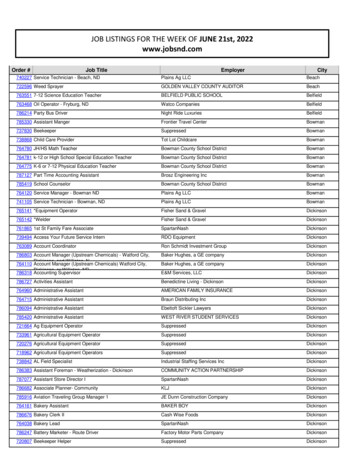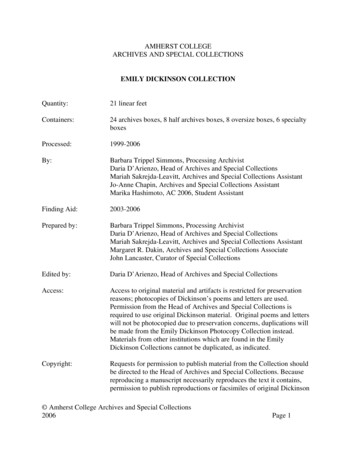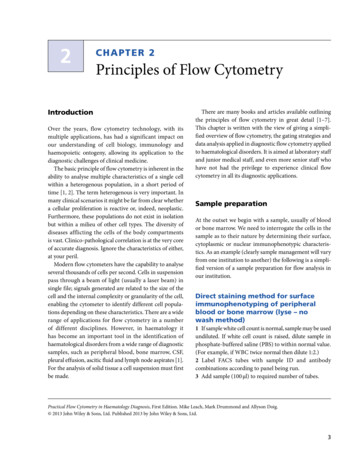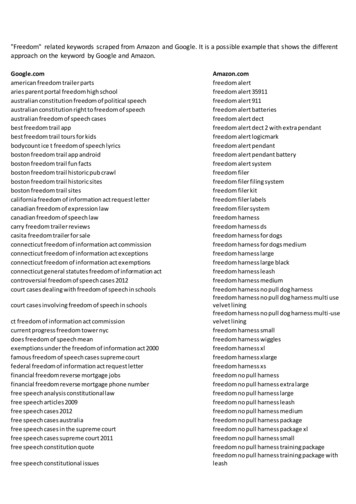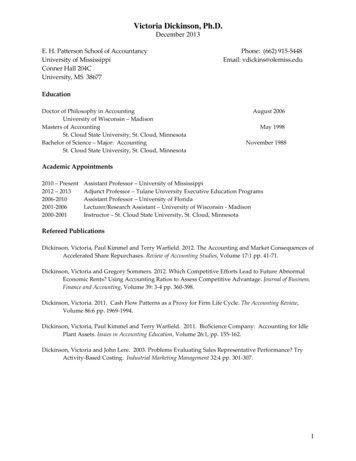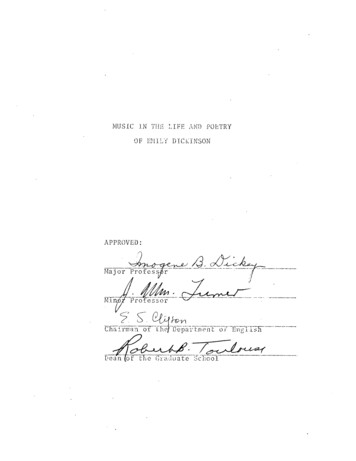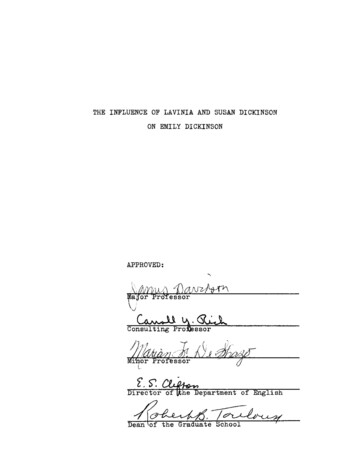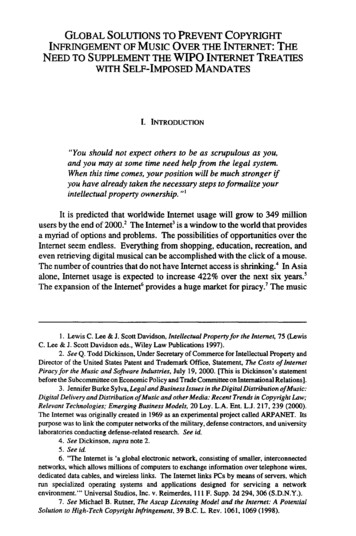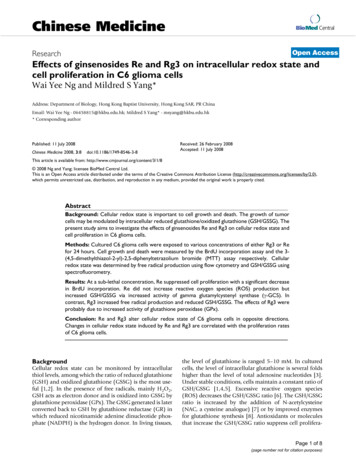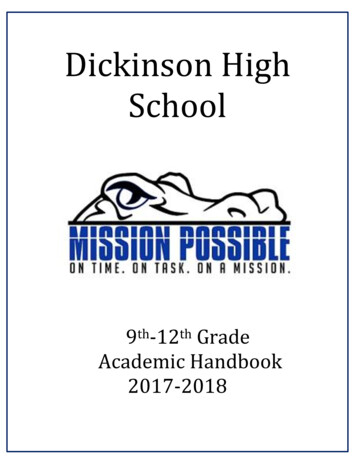
Transcription
Dickinson HighSchool9th-12th GradeAcademic Handbook2017-2018i
ii
Dear Students and Parents:The decisions regarding course selections are some of the most important ones that you will make.We are looking forward to working with you regarding your graduation plan and course selections. Thishandbook contains information regarding graduation requirements, grading procedures, course offeringsand prerequisites for certain courses. Please review each page carefully and make decisions based on postsecondary interests.Sincerely,Dickinson High School CounselorsDickinson Independent School District does not discriminate on the basis of race, religion, color,national origin, sex or disability in providing education services.Dickinson High School 3800 Baker Drive Dickinson, Texas 77539 Phone 281-229-6400 FAX 281-229-6401www.dickinsonisd.orgiii
Dickinson High SchoolPromoting Excellence and EquityAcademic Handbook2017-2018This guide has been designed to provide curriculum information for the 2016-17 school-year. Since it isthe responsibility of students and parents to ensure that all graduation requirements are met, please referto this guide for information regarding course selections that will meet student goals for the future andsatisfy graduation requirements. The guide is designed to provide students with information aboutcourses they will need to meet the increasingly demanding challenges in the work place or a universityprogram.All students are expected to complete the Foundation Plan with an endorsement to graduate fromDickinson High School. Even though each student receives the same diploma, the transcript is theofficial record of all grades earned and all credits awarded. This transcript is stamped with a seal toindicate which state-mandated graduation program the student has achieved. Please see pages 19-22 foran explanation of the types of graduation programs required by the Texas Education Agency (TEA).Students must also pass ELA 1, ELA 2, Algebra I, Biology, and US History STAAR EOC assessmentsas part of their graduation requirement.Notification to Parents/Guardians about Teacher and ParaprofessionalQualificationsAs a parent/guardian of a student in Dickinson Independent School District, you have the right toknow the professional qualifications of the classroom teachers and paraprofessionals who instruct yourchild. The federal law requires that the school district provide this information to you in a timely mannerif you request it. Specifically, you have the right to request the following information about each of yourchild’s teachers and paraprofessionals: Whether the teacher meets the state qualifications and licensing criteria for the grades andsubjects he or she teaches;Whether the teacher is teaching under emergency or professional status because of specialcircumstances;The teacher’s college major, whether the teacher has any advanced degrees, and the field ofdiscipline of the certification or degree; andWhether the paraprofessionals provide services to your child, and, if so, their qualifications.If you would like to receive any of this information, please contact your child’s school.iv
Dickinson High SchoolAcademic Handbook2017-2018Table of ContentsGeneral Information . 1-17Graduation Plans and Endorsements . 18-20Arts and Humanities Endorsements .22-46Fine Arts . 22-33Foreign Language . 34-38Social Studies . 39-46Business and Industry Endorsements . 47-74Agriculture, Food & Natural Resources. 47-51Arts, A/V Technology & Communications . 52-55English & Communications . 56-62Finance . 63-65Manufacturing . 66-68Marketing, Sales & Service . 69-71Transportation, Distribution & Logistics . 72-74Public Services Endorsements . 75-88Education & Training . 75-77Health Sciences . 78-80Human Services (Cosmetology). 81-82Law, Public Safety, Corrections & Security . 83-85AFJROTC . 86-88STEM Endorsements .89-103Engineering . 89-91Math. 92-96Science.97-103Multidisciplinary Endorsement . 104Health and PE .105-107Electives . 108Special Programs .109-110Appendices. 111-132Dual Credit Courses .111-118Workforce Dual Credit Plans .119-123Helpful Information .124-132v
PORTRAIT OF A DICKINSON ISD GRADUATEAn Effective Communicator who: reads, writes, listens, and views interpretively and critically writes and speaks in an organized and clear way reasons and communicates metaphorically and mathematicallyA Self-directed Individual who: demonstrates life-long learning skills lives a healthy lifestyle demonstrates goal-directed behaviors accepts personal responsibility for actions demonstrates honesty and integrity exercises high standards of attendance andpunctualityAn Effective Thinker and Problem-solver who: thinks analytically and creatively uses inductive and deductive reasoning examines issues from a wide variety of perspectives identifies problems and employs appropriate strategies toward their resolution knows how to locate, evaluate, and apply information needed to solve a problem uses a scientific method of inquiry uses technology for research, production, and problem solvingAn Effective Contributor who: initiates and sustains social interactions demonstrates leadership demonstrates the ability to collaborate and cooperate in group activities demonstrates fairness in competition and other social interactions manages resources effectivelyAn Involved Community Member who: participates in the democratic process assumes responsibility for the well-being of his/her community respects the rights and contributions of all people takes the initiative to improve local, state, national, and global environmentsA Participant in the Arts who: recognizes creativity as a reflection of human experiences and human nature expresses personal creativity by developing original and artistic works responds with respect to the creative expression of others1
CREDIT INFORMATIONLOCAL VS. STATE CREDITSState credit means the state of Texas recognizes the course as a credit towards graduation requirements.Local credit is awarded to students taking courses that are locally approved but not recognized by thestate of Texas for graduation.TRANSFER OF CREDITSDickinson ISD recognizes and accepts credits from state accredited public and private high schools.Students entering Dickinson High School from non-accredited public, private, or parochial schools,including home schools, shall validate high school credits for transfer by testing. A student who fallsinto this category will work with his/her counselor to validate transfer credits.CREDIT OPPORTUNITIESThe following opportunities require counselor’s approval, may not be included in the GPA, and mayrequire a fee for enrollment. Advanced Placement (AP) Exams: Students enrolled in an AP course are required to take theAP exam. Students may earn college credit and/or advanced placement. There is a charge for theseexams. Registration is done through the College and Career Center in February. The exams are givenin May. Contact individual colleges to find out which AP exams they will accept and what score isneeded. Scores are available online in July following the exam. Collegiate High School (CHS): College of the Mainland offers a program for 11th and 12thgrade high school students planning to enter a variety of career fields. This program is designed togive 11th and 12th grade students the opportunity to complete high school and most associate degreerequirements simultaneously. The college hours accumulated may transfer to a four-year universityto be applied toward a degree. Participants will pay a portion of the college tuition fees. Studentsmust adhere to application and registration deadlines. Students must have transportation to and fromCollege of the Mainland. CHS students are not eligible to be recognized for Valedictorian orSalutatorian. Applications are due to counselor May 1st or first business day in May. See yourcounselor for additional information. Concurrent Enrollment: Students may be concurrently enrolled in both high school andcollege courses for college credit. Concurrent courses do not receive high school credit. Counselorapproval is required prior to enrollment. Correspondence Course: Students may take courses through distance learning options such as Texas Virtual School Network, Texas Tech, or other approved program. Counselor approval isrequired prior to enrollment.Credit by Exam with Prior Instruction: This exam is for students who have had priorinstruction and failed the class. A score of 70 or above on the exam is required for credit. Each examis equivalent to a semester course. See counselor for more information.Credit by Exam without Prior Instruction: Students may earn credit for a course in whichthey have received no prior instruction in the subject by taking an exam in December, March, Juneor July. A grade of 80% is required to receive credit for the respective course. See counselor forregistration form.2
Dickinson Continuation Center (DCC): DCC is a non-traditional educational setting that isnot directly linked to disciplinary placement. DCC is a dropout prevention/credit recovery programthat offers flexible class schedules to meet the needs of the students. The purpose of DCC is to givestudents an opportunity to earn credits at an accelerated rate and graduate in a timely manner.Success in this program depends on the student’s character and commitment to the program.Students must provide own transportation. The campus is located at 2805 Oak Park Dickinson,Texas. DCC uses computer-based learning and supplemental direct instruction. Most studentscomplete the Foundation Plan without endorsements. Students who graduate through DCCparticipate in the DHS graduation and are awarded a high school diploma. Entry into this program isby application only. Students are not included in the DHS ranking and are not eligible to berecognized as Valedictorian or Salutatorian. Students who are interested may pick up an applicationfrom their counselor.Dual Credit: Students may earn college hours and high school credit from the same course during10th- 12th grade. You must apply for admission to the College of the Mainland, pass all the requiredEOC tests, and pass the TSI test prior to admission. These courses are college courses. Studentsenrolled in these courses will pay college tuition at a reduced rate and purchase textbooks.Counselor approval is required prior to enrollment. Students must complete registration processby May for the Fall. Some dual credit courses start before normal school hours therefore studentsmust have transportation. The school buses do not arrive in time for dual credit courses.Dual Credit Workforce Programs: Same as dual credit description with the exception thatthe courses are offered at College of the Mainland in the afternoon. Students must have owntransportation to participate. Available programs are described on pages 118-122.Online Credit Recovery: An online credit recovery program is available at DHS. Studentsmay also work on the online courses from home. Courses are self- paced and require students to beself- motivated. Counselors recommend students for the course. Students receive credit for thecourses successfully completed. The grades will not be calculated in the GPA. Note to StudentAthletes: Online credit recovery courses cannot be used to reinstate UIL eligibility nor are theyrecognized by the NCAA Eligibility Center.Night School or Summer School: See counselor for information on approved night schooland summer school programs. Classes must meet all TEA guidelines.SPECIAL PROGRAMSDickinson High School offers a variety of specialized programs for students with individual needs.These programs include screening for special programs, dyslexia, English for Speakers of OtherLanguages (ELL), 504/Americans with Disabilities Act (ADA) and federal programs mandated by theIndividuals with Disabilities Act (IDEA). Each program includes specific guidelines for qualification.3
DISD Family Guide to Response to Intervention (RtI)DISD schools are committed to helping all children succeed. Campuses have many ways to helpchildren who are struggling to learn and need additional supports to be successful. Response toIntervention (RtI) is one form of support.This guide reviews the basic components of any RtI process and includes questions you might ask tolearn more about their RtI process. Also included are ways you can get involved in the process and whatto do and where to go if you have questions or concerns.What is RtI?Response to Intervention is “the practice of providing high-quality instruction and interventions matchedto student need, monitoring progress frequently to make decisions about changes in instruction or goals,and applying student response data to important educational decisions.” (National Association of StateDirectors of Special Education, 2006).What are the benefits of RtI?RtI provides structure; it holds the promise of ensuring that all children have access to high qualityinstruction and that struggling learners, including those with learning disabilities are identified,supported and served early and effectively. An essential assumption of RtI is that all students can learn,and will, given the right opportunities.What does RtI look like?The Tiered Delivery Model is central to RtI. It is a model of support designed to improve the deliveryof instruction to all students. It is more than a campus intervention team it is a problem-solvingsystem which empowers educators to identify and provide intervention and support to students who areexperiencing educational difficulties. Each level represents a grouping of students whose differingneeds are met with more intensive (sometimes different) instructional approaches. Parents are involvedin all Tiers of the RtI process. In Tier 1, the base or largest level, represents the majority of students, largely served by the core instructionalprogram (general education classroom), which is monitored for effectiveness. In Tier 2 represents a smaller grouping of students who may require additional help—interventions—in additionto (though not replacing) core instruction, to achieve the learning rate necessary to meet grade level expectations. In Tier 3 represents a still smaller group who need even more assistance—intensive interventions—to achieve thesame goals.Who do I contact about how RtI works in my child’s school?For more information about RtI at your child’s campus please contact the school counselor or a campusadministrator.4
Dickinson High SchoolPre-Advanced Placement and Advanced Placement ProgramEquity and Access to PreAP, AP and Honors CoursesDickinson ISD has a genuine commitment to preparing ALL students for challenging high schoolcoursework and post high school success in college, in the workplace, and/or in the military. Opportunitiesfor enrollment in Pre-Advanced Placement (Pre-AP) and Advanced Placement (AP) courses are open andmade available to ALL Dickinson High School students. Because Pre-AP and AP courses are designed ascollege preparation and/or college level courses, students must have demonstrated their academicpreparedness and their willingness to invest the time and effort required for success in rigorous courses.College Board research clearly shows that students who participate in challenging coursework, includingPre-AP and AP courses, have considerably higher success in college.Benefits of Pre-AP CoursesA Different Kind of Class: Through increased rigor, Pre-AP courses help students acquire the skills and academic habits needed forsuccess in high school and beyond. Students will improve critical reading, writing, and problem-solvingskills as a result of successful completion of these courses. In addition, students' time management, notetaking, and study skills will be greatly enhanced. A Pre-AP classroom is different from an academic class. Instruction in the Pre-AP classroom focuseson intense discussions, rigorous real-world applications, analytical thinking, critical reading, andpersuasive/expository writing. Students are held to a high standard of academic engagement. Pre-AP courses provide preparation for success in the subsequent AP course and toward earning aqualifying score on the corresponding College Board AP Exam.Advanced Placement (AP) CoursesA Different Kind of Class: AP courses are highly rigorous courses for which college credit may be earned. The course syllabus is approved by College Board. Teachers are highly trained through College Board workshops and institutes. AP courses conclude with a final examination written and scored by College Board. AP courses require a high level of student commitment and academic engagement.Considerations for Entry into Pre-AP and AP CoursesStudent's willingness and ability to: Prioritize time and interests Commit a minimum of three hours of out-of-class time per week for each course Approach challenging coursework with a positive attitude Complete summer and outside reading and writing assignments Maintain a strong work ethic Maximize independent study habits Critically question and discuss complex concepts Monitor and evaluate progress Meet expectations on state assessments Adhere to the district's class exit procedures and timelines (see Exit Form)5
Pre-AP/ AP/ Honors Admission CriteriaIn an effort to place students in appropriate level classes, admission criteria have been established forPre-AP, AP, and Honors courses. The academic records for all students who register for a PreAP, APand/or Honors course will be evaluated against the following criteria when students complete theircourse selections for following school year:Previous Academic Performance. Yearly average of 80 (B) in an Academic course and75 (C) in a Pre-AP or an AP course immediately preceding the Pre-AP/AP course.STAAR and End of Course (EOC) Assessment. It is highly recommended that students meet orexceed the STAAR and End of Course score for entry into each Pre-AP, AP, or Honors course.Demonstrated academic achievement on the state assessments indicates that the student has theknowledge and skills necessary for success in the rigorous college preparatory (Pre-AP), Honors, andcollege level (AP) courses. The chart on the following page includes the minimum STAAR/ EOCscore recommended for entry into Pre-AP/AP courses. The scores are based on passingapproximately 70% of the previous STAAR. Raw scores are typically consistent from test to testwhereas scale scores may fluctuate based on test date and format (computer/ paper). The raw scorewill be used to determine eligibility.Appeal of Criteria. Students and parents may appeal to the campus review committee which mayconsist of the course teacher, the department chairperson, the AVID teacher, the student's counselor, acampus administrator, the student's parent and/or primary caretaker, and the student. Appeal formswill be available in the counselor’s office and will be due by the last day of school.ExpectationsMandatory Parent Meeting in Spring. All parents are required to attend one of the parent meetingsheld during the Spring semester.Summer Assignments. Completion of ALL summer assignments by the 7th calendar day from thefirst day of school (including the first day of school). This applies to all returning DISD students. Aseven day grace period from the day of enrollment will be granted for students new to DISD. Failureto complete summer assignments may result in being removed at the first 9 weeks due to failinggrades.Commitment Statement. A contract signed by both student and parent will be due the first week ofschool or upon enrollment for new students.AP Exams. The purpose of AP courses is to earn college credit. Students enrolled in AP courses areexpected to register and take the respective AP Exam(s) in May. Registration will be in March. Costper exam ranges from 60 to 82 depending on state approved reductions. Students eligible for thefree/reduced meal program will receive a reduced rate.6
Required state assessment scores are based on the course grade in the previous coursepertaining to the PreAP, AP, or Honors course. Most test scores are based on passing 70% ofthe previous STAAR test. Raw scores do not change whereas the scale scores fluctuate eachtest date. The raw score will be used to determine eligibility.AssessmentGrade of 80-100in previousRegularAcademic courseGrade of 75-100in previousPreAP or APcourseEntry Into Course(Raw Score# correct)(Raw Score# correct)Grade 8 Reading3838Grade 8 ReadingGrade 8 Math45364536Grade 8 ScienceGrade 8 Social StudiesGrade 8 Social StudiesEnglish I EOC3837436438374364PreAP BiologyPreAP W. GeographyAP Human GeographyPreAP English IIPreAP PhysicsPreAP Spanish/FrenchPreAP World HistoryEnglish I EOC7676AP World HistoryAlgebra I EOC3535PreAP GeometryPreAP Algebra IIPreAP Pre-CalculusAP CalculusAP StatisticsAlgebra 1 EOC3838Biology EOC3838English II EOC6464PreAP / AP ChemistryPreAP/AP PhysicsAP BiologyHonors Anatomy andPhysiologyAP Environmental SystemsPreAP / AP ChemistryAP English III LanguageAP English IV LiteratureAP US HistoryAP European HistoryAP GovernmentAP EconomicsPreAP Spanish/FrenchAP Spanish/FrenchPreAP/ AP PhysicsPreAP English IPreAP W. GeographyPreAP Spanish/ FrenchAP Human GeographyPreAP Algebra I7
Exit from a Pre-AP/AP/ Honors ClassCollege and university admissions officers have repeatedly indicated that high school studentswho successfully complete a PreAP/AP course are given greater consideration when all othercollege admissions indicators are equal. A transcript that indicates that a student has earned a"C" in a PreAP/AP course is given higher consideration than one who earns an "A" in anacademic course. For this reason, DHS counselors, administrators, and teachers stronglyadvise PreAP/AP students to stay in the course working through difficulties by attendingtutorials, doing extra reading/work at home, joining a student study group, and taking copiousnotes in class. If a student indicates that he/she wants out of the class and scheduled into thecorresponding academic class, the following timeline and procedure(s) must be followed. Exitpoints are built into our registration and master scheduling process. Exit Point #1. Students are registered for courses during the spring of the previous schoolyear. It is important that students carefully select their coursework making wise decisionsbased on their time commitments, their interests, and their demonstrated academicachievement. Parents are given a course selection sheet in early March in order to provideparents with an opportunity for parental input in the course selections. Parents may makechanges and return the course verification sheet to the counselor by mid-April. The first exitpoint after initial registration will be made available to all students in May. All students willreview their course selections during the last two weeks of the school year prior. Students mayrequest a schedule change during this time. A parent/primary caregiver signature is requiredfor the schedule change. Exit Point #2 First 9 Weeks. Pre-AP/AP students who are failing the Pre-AP/AP course theend of the first grading period are in danger of failing for the semester. Serious considerationmust be given to the students' willingness to complete the rigorous coursework and to his/hertime commitments in order for him/her to be successful and earn the .5 credit for the firstsemester. Pre-AP/AP students who are failing a Pre-AP/AP course at the end of the first 9weeks will be moved to the respective academic course. Students with a 65-69 may remain inthe course as long as the student, parent, and teacher agree the student has the ability to passfor the semester. The student’s parent or primary caregiver will be notified by the Pre-AP/APteacher about failing grade and course of action at the end of the 9 weeks. Exit Point #3 End of the First Semester. Any student who fails a Pre-AP/AP course with agrade below 70 for the first semester will be removed from the course at the end of the firstsemester. The student's parent or primary caregiver will be notified by the Pre-AP/AP teacherof the failing grade which will result in a schedule change. Parents may also request to removethe student from the course for the second semester. Parent or primary caregiver must notifythe counselor before the first business day in December.8
STUDENT GRADE LEVELGRADE CLASSIFICATIONGrade classification is based on the total number of credits a student has accumulated:Tenth GradeEleventh GradeTwelfth Grade6.012.019.0GRADES and GRADINGGRADING SYSTEMProgress report grades are reported for each student every 3 weeks. At the end of each 9 weeks gradingperiod, grades are numerically reported for each student. At the end of each semester, a student receivescredit for a course if the semester average for the course is a 70 or above. In order to receive credit, thestudent must be in attendance for more than 95% of the time that a course meets. The semester grade iscalculated using the following formula:First 9 Weeks (45%) Second 9 Weeks (45%) Semester Exam (10%) Semester GradeGRADE AVERAGING TO RECEIVE CREDITGrade averaging will be utilized for year- long courses if the grade is at least a 60 for either semester.The other semester must have a grade higher than a 70 that averages with the failing semester grade toachieve a final grade of 70. Courses must be taken during same school year. Courses taken in summerschool or credit recovery are not considered for grade averaging. The failed semester is notcounted for NCAA.Exception to the rule: math and year one foreign language courses. These courses will only be eligiblefor grade averaging if the student earns a grade of 60-69 during the first semester and a grade of 71 orhigher second semester. Courses must be taken during same school year. Should a student pass the firstsemester of the math or foreign language I course but fail the second semester, grade averaging is notpermitted, and .5 credits will be awarded only for the first semester.Example:CourseEnglishHistoryAlgebra 1Spanish 11st Semester637878652nd Semester Credit Earned781.0621.0620.5781.09
GRADE POINTS/GRADE POINT AVERAGING FOR CLASS RANKINGClass ranking for each student in the graduating class shall be determined by averaging the semestergrade points through the 7th semester of high school. Honor graduates, including Valedictorian andSalutatorian, will be named after the final class rank. No distinction is made between four-year andthree-year graduates. There will be an exception for early graduates from the class of 2019 due to thechange in grade point scale. Students graduating early from the 2019 cohort will be recalculated usingthe 2014 grade point scale in order to be eligible for Valedictorian/ Salutatorian.All courses taken within the regular school day and regular school year shall carry grade points,including those grades transferred from other accredited high schools. Grades for courses in which creditwas earned in credit recovery, outside the regular school day (i.e. evening school) or outside of theregular school year (i.e. summer school) shall not be included in the computation of a student’s GPA. Inaddition, courses for which high school credit was earned before the student entered high school shallnot be included in the computation. Grade points shall be awarded for course work according to thefollowing scales based on the year student started 9th grade:Entered 9th grade 2014*Grade Points EarnedNumerical Grade Letter Grade*Dual Credit/Alternate CoursesAcademicPre-AP/AP/ Honors(3 point scale)(4 point scale)(4 point weighted scale)95-100A / A5.04.090-1003.090-94A4.53.585-89B / B4.03.080-892.080-84B3.52.575-79C / C3.02.070-791.070-74C2.51.50-69D/ F0.00.00-690.0*Dual credit courses taken at DHS and Collegiate High School will be calculated on the Pre-AP/ APgrading scale.Entered 9th grade 2015 and beyondGrade Points EarnedLetter*Dual Credit/ AP Pre-AP/ HonorsAlternateNumericalAcademicGrade(4 point weighted(4 pointCoursesGrade(4 point scale)scale)weighted scale)(3 point scale)95-100A / A6.05.04.090-1003.090-94A5.54.53.585-89B / B5
Dickinson High School Counselors Dickinson Independent School District does not discriminate on the basis of race, religion, color, national origin, sex or disability in providing education services. Dickinson High School 3800 Baker Drive Dickinson, Texas 77539 Phone 281-229-6400 FAX 281-229-6401 www.dickinsonisd.org
